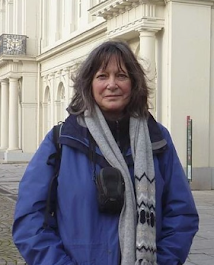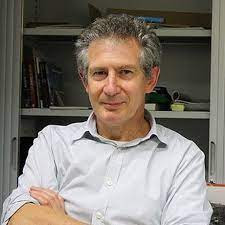The Brussels Brontë Group on Saturday 30 April 2022 could finally get together in a real-life venue instead of on Zoom. What a relief to see each other again, talk to friends, have a coffee and a lovely piece of cake, finally some sort of normality is getting back into our lives.
On the programme we had two talks with a Brussels theme. Very appropriate indeed.
The first talk was given by Monica Kendall:
“Do you like the truth? The Brontës and my family”. Monica wrote a book about
her ancestors, Evan and Eliza Jenkins and their family, who were in Brussels at
the time that Charlotte and Emily were studying at the Pensionnat Heger. Her
book is called: “Lies and the Brontës: The Quest for the Jenkins Family”. A
very intriguing title!
About ten years ago, she became aware of
the link between her great great grandparents and the Brontës and started her
research, at first naively thinking that by reading the Brontë biographies she
would learn more about her ancestors. She referred, among others, to the
biographies of Elizabeth Gaskell, Ellis Chadwick, Juliet Barker, Rebecca Fraser
and Claire Harman. To her great astonishment, she found that some of the
biographies contain incorrect data, fabrications, fiction, etc., which she
blamed on poor research, a desire for novelty and inadequate checking of
information in prior biographies.
She decided then and there to take up the
battle and set the record straight, at least as far as her ancestors were
concerned. Her research took seven years. She joked that she selected the
(rather strong) word LIES for her title because this was the word that would
fit best on the spine of the book.
 |
| Monica Kendall |
- Mrs
Chadwick never met Eliza Jenkins (she was only two years old when Eliza died)
- Charlotte
and Emily were not chaperoned by both Edward and John Jenkins (John being only
seven years old)
- Charlotte
travelled by train and not by diligence to Brussels from Ostend
- Mrs.
Heger would not have “accompanied” Charlotte to Ostend (being a mother of five
children and it being a winter day)
Monica also mentioned some similarities
between her ancestors and “Villette” characters. For instance: Dr. Graham could
have been based on Edward Jenkins (son of Evan and Eliza); and Paulina could
have been based on Mina (youngest daughter of Evan and Eliza).
Other connections between the Brontë family
and the Jenkins family were referred to as well, e.g. David Jenkins (brother of
Evan) was a close colleague of Rev. Patrick Brontë in Yorkshire.
I enjoyed this talk very much. It was
fascinating to hear that so much false information about the Brontës and the
Jenkins’ family has been published over the years, information we Brontë fans
believed to be true.
Monica’s book is full of interesting
informative nuggets and connections. You will have to read it for yourself to
find them all. As it is a very heavy book to carry around, I intend to read it
during my holidays and not on the “train” to work!😉
The second talk on Saturday was by Derek
Blyth: “A Brussels Brontë ramble”.
Derek is a well-known columnist, journalist
and guide-book writer. I remember him from a Brontë walk that he led in the
first years of the BBG. He does not claim to be a Brontë expert but knows a lot
about Brussels and Belgium as he is a long-standing Brussels resident. His
focus was therefore on the word “ramble”.
He said he has always been astonished by
the fact that Belgium seems to have so little respect and recognition for
writers who have stayed in Brussels and used it in their work (such as
Charlotte Brontë). There is a plaque for Charlotte and Emily at the Palais des
Beaux Arts, but it is high up on a wall and difficult to read.
Derek was wondering why foreigners would
come to Brussels? In the old days, people fled their country because of debts,
because they were poor, because they risked persecution, he said. He recalled
the story of the Oscar ceremony in 2017 when the wrong movie was announced as
Best Film. The writer of the script of the movie that won was afterwards asked
where he wrote the screenplay and he replied: in Brussels. Why? Because it was
a quiet place where nothing happened and where he could write while not being
disturbed. 
Derek Blyth
Derek said he has the impression that literature and film are not really high in the ranking of Arts in Brussels. He listed writers who have worked in Brussels but their Belgian connection gets little recognition: Eduard Douwes Dekker (whose pen name was Multatuli) wrote “Max Havelaar” in Brussels; Karl Marx started “The Communist Manifesto” in Brussels; Lord Byron stayed in Brussels; Victor Hugo came to Brussels several times; Joseph Conrad came to Brussels when took up a post for a Belgian company in Congo, which experience became the inspiration for “Heart of Darkness”. Brussels seems to have a long history of attracting writers but failing to recognize them properly, he said.
For Brontë fans, the biggest example is of
course Charlotte Brontë. She came to Brussels to learn French with a view of
opening a school in Haworth. Of all the options she had, she selected Brussels
(one reason being that her friend Mary Taylor was already studying in
Brussels). Charlotte did not flee her country for debts or persecution, but
came to Belgium with a thirst to learn, to see, to experience. She called
Belgium “my promised land”. She really made a case for Belgium and Brussels.
Two of her books (“The Professor” and “Villette”) are set in Brussels and
Belgium. Derek holds the view that Charlotte Brontë really deserves to have a
statue in Brussels.
He recalled that the BBG has tried to get a
statue of the Brontës in Brussels, but has so far been unsuccessful. An
exhibition on the Brontës or other ideas are still a possibility. To be
continued … all suggestions are welcome.
Derek ended his ramble by suggesting that
another option to honour Charlotte Brontë and her relationship with Brussels
would be that someone writes a screenplay for a film of “Villette”, perhaps in
a quiet pub in Brussels, and gets it nominated for an Oscar as best foreign
film –- can someone make this happen?
Who knows …
Marina Saegerman
1st May 2022

No comments:
Post a Comment